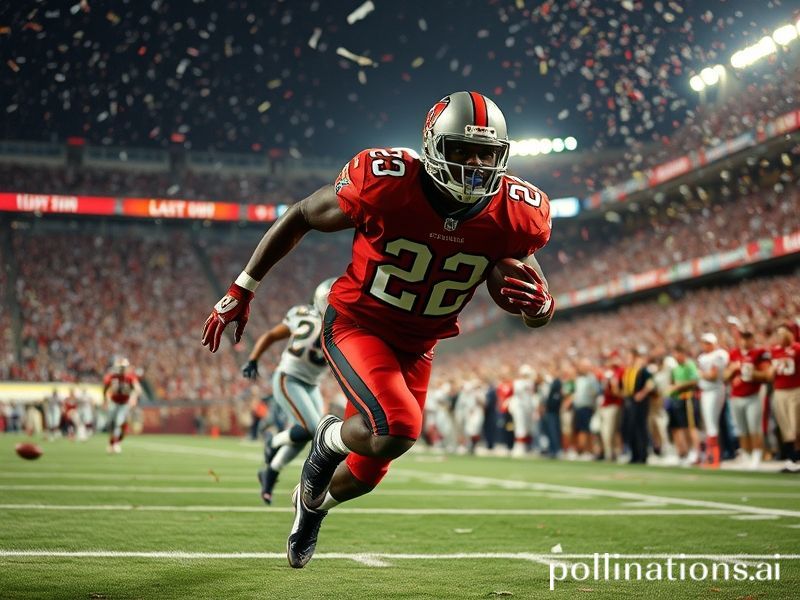Ronde Barber: The NFL’s Quiet Envoy in a World That Still Calls It ‘Hand-Egg’
Ronde Barber, the Man Who Tackled the World (and Barely Bruised It)
If you whisper “Ronde Barber” in a smoky bar in Lisbon, the bartender will probably slide you an espresso and ask whether you mean the guy who single-handedly reminded Europe that American football exists or the balding deity who once ended the Philadelphia Eagles’ Super Bowl hopes with the grace of a Swiss banker foreclosing on a vineyard. Either way, the name still travels farther than most passports, and for reasons that extend well beyond the chalk-striped hash marks of Raymond James Stadium.
Barber’s pick-six against Donovan McNabb in the 2003 NFC Championship was, for the United States, a tidy bit of regional schadenfreude. Yet for the rest of the planet—where “football” still implies a round ball and theatrical shin fractures—it was a masterclass in exporting existential dread. One moment, a continent of insomniacs streaming grainy feeds on SopCast thought they were watching a glorified rugby reboot; the next, a 5-foot-10 cornerback had turned the sport into a geopolitical metaphor. The Eagles, representing America’s perpetually disappointed middle class, were felled by a defender whose twin brother played for the offense they’d just left on the field. Somewhere in Brussels, an EU trade negotiator took notes.
Globalization has many fathers—container ships, fiber-optic cables, that one uncle who insists on shipping Amazon Basics to rural Moldova—but few anticipated that an NFL nickel package would become a soft-power pipeline. Barber’s longevity (16 seasons, 47 interceptions, 28 sacks, and exactly zero public scandals) dovetailed with the league’s relentless march into foreign markets. In 2009, Barber jerseys outsold David Beckham kits in four Asian countries whose citizens still can’t locate Tampa on a map. Analysts blamed pirated broadcasts; cynics blamed the jerseys’ pleasing creamsicle hue, which matched the sunset of Western hegemony.
The twin angle helps. Ronde and Tiki Barber were the human embodiment of every multinational’s org-chart fever dream: identical products, different divisions, perpetual competition. One racked up yards for the Giants, the other denied them for the Buccaneers. Their sibling rivalry became a parable for the modern workforce—two men genetically engineered for synergy yet contractually obligated to concuss each other. When Tiki retired early to pursue broadcast journalism, Ronde stayed on for seven more seasons, a living reminder that commitment is just a polite word for an inability to read market signals.
Meanwhile, the world economy convulsed. Greece discovered debt, Britain discovered Brexit, and TikTok discovered teenagers. Barber kept showing up on Sundays, tackling the future like it owed him compound interest. In 2012, he became the first player in NFL history with 40+ interceptions and 25+ sacks, a statistical anomaly that prompted Swiss statisticians to recalibrate their models of human longevity. The Nobel committee remained unmoved; they’d already given the Peace Prize to the EU for not disintegrating that week.
Off the field, Barber’s post-retirement pivot to broadcasting for Fox Sports placed him in living rooms from Lagos to Lahore, courtesy of satellite packages bundled with cricket and Filipino soap operas. His commentary style—equal parts chess grandmaster and disappointed father—translates well to cultures already fluent in fatalism. When he calmly explains why a cornerback should never bite on a double move, viewers in countries with fluctuating currencies nod knowingly: the world, too, has been biting on double moves since 2008.
Today, Barber serves on the board of the league’s International Player Pathway program, which converts oversized rugby players from the Commonwealth into special-teamers who last approximately 1.7 seasons. It’s either colonialism in reverse or the most honest labor exchange the planet currently offers—take your pick. Either way, every time a Tongan linebacker records a tackle, Ronde Barber’s ghostly fingerprints are on the passport stamp.
So raise a glass—preferably something local, overpriced, and faintly disappointing—to the man who proved that American exceptionalism can, in fact, be covered one-on-one. The globe keeps spinning, empires rise and fall, but somewhere a 48-year-old in a trim suit is still breaking down film, reminding us that while history may be written by the victors, the replays belong to the cynics.







